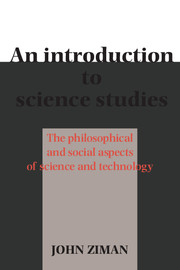Book contents
- Frontmatter
- Contents
- Preface
- 1 ‘Academic’ science
- 2 Research
- 3 Validity
- 4 Communication
- 5 Authority
- 6 Rules and norms
- 7 Change
- 8 The sociology of scientific knowledge
- 9 Science and technology
- 10 Pure and applied science
- 11 Collectivized science
- 12 R & D organizations
- 13 The economics of research
- 14 Science and the State
- 15 The scientist in society
- 16 Science as a cultural resource
- Index
9 - Science and technology
Published online by Cambridge University Press: 05 August 2012
- Frontmatter
- Contents
- Preface
- 1 ‘Academic’ science
- 2 Research
- 3 Validity
- 4 Communication
- 5 Authority
- 6 Rules and norms
- 7 Change
- 8 The sociology of scientific knowledge
- 9 Science and technology
- 10 Pure and applied science
- 11 Collectivized science
- 12 R & D organizations
- 13 The economics of research
- 14 Science and the State
- 15 The scientist in society
- 16 Science as a cultural resource
- Index
Summary
‘The outlook for gaining useful energy from the atoms by artificial processes of transformation does not look very promising.’
Ernest Rutherford (1937)Science as an instrument
Up to this point, we have been looking at science from the ‘inside’: now we take an entirely different standpoint, and consider science from the ‘outside’. The external sociology of science considers it simply as a social institution, embedded in society, and performing certain functions for society as a whole, on a par with other institutions associated with law, religion, political authority and so on. For the moment we shall treat science as a ‘black box’, whose inner workings are of no significance except to ensure that it can perform the functions assigned to it. Eventually (§12.5) we shall reopen this box, and reconsider the internal sociology and philosophy of science from an externalist point of view.
Science is valued by ordinary citizens, by powerful individuals such as politicians and company directors, and by corporate bodies such as commercial firms and government agencies, primarily for its use. It is fostered mainly as a resource to be applied to the furtherance of individual and/or collective activities whose goals are not specifically the advancement of knowledge. This conception of science as essentially an instrument for achieving a variety of goals other than the acquisition of knowledge is so widespread and so dominant in our society that it overshadows all other conceptions of its social function.
- Type
- Chapter
- Information
- An Introduction to Science StudiesThe Philosophical and Social Aspects of Science and Technology, pp. 112 - 120Publisher: Cambridge University PressPrint publication year: 1984



